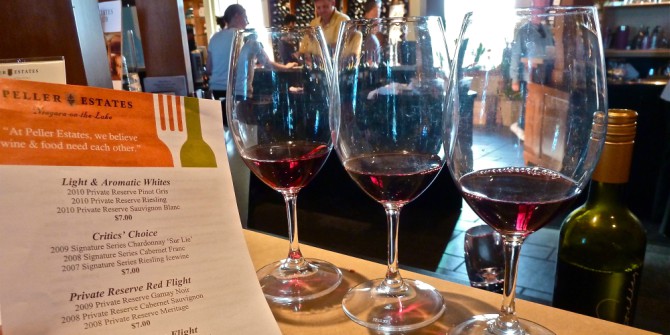
Organisations ranging from giants such as Apple and Amazon to small wineries and fashion boutiques regularly commit resources to persuading others to tout their innovative products. The results of these efforts are often mixed – some can build a passionate following that spreads news of how groundbreaking or remarkable a product might be, and some waste resources on customers that never fully engage. Without word-of-mouth, organisations tend to falter and stumble waiting for their ideas to catch on in crowded, fast-moving markets where chances to stoke customer devotion are few and far between.
The case of cool-climate winemaking in Ontario, Canada sheds new light on how companies might successfully and reliably work to “convert” occasional customers or industry spectators into evangelists fervently “spreading the word” about their innovations.
Over the 165-year-long history of winemaking in Ontario, wineries have made strides to overcome a negative reputation for low-quality production. The origins of Ontario wine’s poor reputation can be traced back to the 1860s, when its first wineries produced wine using indigenous grapes that could survive the region’s harsh winters, but that did not conform to entrenched, “Old World” winemaking standards. In the 1970s, winemakers engaged in large-scale production of low-quality, mass-market wines that further cemented the region’s reputation for poor quality. In the 1980s, however, free trade agreements lifted protections that had shielded Ontario wineries from global competition, forcing producers to reinvent their practice. Wineries collaborated to establish rules of practice and standards that significantly elevated the quality of the product.
Despite these efforts, critics, restaurant operators and connoisseurs, citing concerns over poor reputation, largely ignored or dismissed Ontario’s fine winemakers. Lacking in financial resources as well as channels to spread positive news of Ontario wine, winemakers chose to step outside traditional ways and means of convincing people to try Ontario wine to attempt a different strategy: engage those who dismissed their efforts directly and actively seek their support. They reached out to wine media, restaurant industry, wine expert groups, and even customers that were not already immersed in the local wine scene. Through what seemed from a distance like sheer force of will, they successfully inspired them to advocate for the inclusion of Ontario wines in wine competitions, media, and restaurant menus, as well as to run events and start organisations celebrating it. But how did they go about lighting the fire that moved these different people to not only try their wine, but act on their behalf?
It turns out that wineries conceived of and deployed something that has been used to build devotion for millennia: conversion rituals. These rituals involved three principal components that worked in concert to create remarkable experiences.
- First, ceremonies encompassed “staged” interactions between winery operators and drinkers that were conducted during wine tastings, tours, and winemaker dinners.
- Second, artefacts such as unique wine glasses and decor with symbolic value were used during ceremonies to introduce sensory experiences.
- Third, accounts, including descriptive language and stories, guided the sensory experience of these artefacts and set the tone for the ceremonies.
Interestingly, we observed that wineries would “flavour” their rituals differently, drawing on different themes that they believed would showcase their strengths and make the rituals more appealing. Some wineries favoured provenance-themed rituals, where they pointed to their family histories, their European roots and experiences, or highlighted the lineage of winemaking techniques. Others focused on enhancing the enjoyment and on communicating the indulgence associated with winemaking via hedonic-themed rituals. Some even relied on glory-themed rituals focused on praise, honours, or distinctions bestowed by status-granting audiences, as well as ostentatious displays of grandeur. These themes would set a winery apart and make the ritual unique and, in some cases, even more moving.
In fact, some participants in rituals reported memorable emotional experiences that included reverence, elation and awe. These experiences moved them to seek out and engage in proselytising (i.e., attempting to persuade others to try and promote Ontario wines) and organising (i.e., creating groups, blogs or other vehicles through which they could share Ontario wines). The rituals were not, however, always effective. Only those “open” to these experiences – because they felt like they were invested in Ontario or in food and wine culture – tended to experience this full range of emotions and become evangelists. Those who were not, tended to experience the rituals as elaborate sales or marketing tactics and maintain an arm’s-length relationship with the wineries.
Ultimately, we found that successful wineries could convert customers into de facto extensions of their organisations. They used their limited budget to build a devoted, yet unpaid, sales force that both consumed their wine and spread the word about their burgeoning wine region. The case of cool-climate winemaking in Ontario teaches us lessons that can be used by any organisation about the importance of ritual not only to onboard and retain employees, but to enable influence that extends far beyond organisational boundaries. It also speaks to the need for a deep understanding of what moves external stakeholders and what complex identities guide their behaviours.
♣♣♣
- This blog post is based on the authors’ paper Emotions Uncorked: Inspiring Evangelism for the Emerging Practice of Cool-Climate Winemaking in Ontario, Academy of Management Journal, April 2017
- The post gives the views of its author, not the position of LSE Business Review or the London School of Economics.
- Featured image credit: Private Reserve Red Flight, by Deb Nystrom, under a CC-BY-2.0 licence
- Before commenting, please read our Comment Policy.

Felipe G. Massa is an Assistant Professor of Management and Kloor Professor of Entrepreneurship and Small Business at the College of Business at Loyola University New Orleans. He is also the founding faculty member of the Loyola University Center for Entrepreneurship and Community Development. He received his PhD from the Carroll School of Management at Boston College. His research is focused on the efforts of collectives that violate institutional boundaries and span social worlds to introduce disruptive practices and ideas. His work has been published in leading outlets including the Academy of Management Journal, Organization Science, Organization Studies, and the Journal of Business Ethics, among others.
 Wesley Helms is Associate Professor of Management at the Goodman School of Business, Brock University, Ontario, Canada. Dr. Helms’s research interests are on how new and sometimes contested practices become increasingly accepted by key audiences. In particular, he focuses on the strategic actions that actors take on behalf of those practices they care about and whether those actions shape the meaning of, and spread, those practices. His research has covered the practices of Corporate Social Responsibility, Mixed Martial Arts, Ontario fine wine making, and, most recently, the value creation activities of social enterprises.
Wesley Helms is Associate Professor of Management at the Goodman School of Business, Brock University, Ontario, Canada. Dr. Helms’s research interests are on how new and sometimes contested practices become increasingly accepted by key audiences. In particular, he focuses on the strategic actions that actors take on behalf of those practices they care about and whether those actions shape the meaning of, and spread, those practices. His research has covered the practices of Corporate Social Responsibility, Mixed Martial Arts, Ontario fine wine making, and, most recently, the value creation activities of social enterprises.
 Maxim Voronov (Ph.D., Columbia University) is Professor of Management at the Goodman School of Business, Brock University, Ontario, Canada. He conducts research on how culture (such as institutional arrangements, social norms, and history) influences organizations and people, as well as on how culture can be used strategically. He is especially interested in the roles that emotions and power play in these processes. Dr. Voronov explored these issues in a variety of industries and organizations, including Ontario wine and restaurant industries and Canadian whisky industry. His work appears or is forthcoming in such leading management journals as Academy of Management Review, Academy of Management Journal, Journal of Management Studies, Human Relations, and Organization, among others. More information about Dr. Voronov can be found at: http://maximvoronov.net .
Maxim Voronov (Ph.D., Columbia University) is Professor of Management at the Goodman School of Business, Brock University, Ontario, Canada. He conducts research on how culture (such as institutional arrangements, social norms, and history) influences organizations and people, as well as on how culture can be used strategically. He is especially interested in the roles that emotions and power play in these processes. Dr. Voronov explored these issues in a variety of industries and organizations, including Ontario wine and restaurant industries and Canadian whisky industry. His work appears or is forthcoming in such leading management journals as Academy of Management Review, Academy of Management Journal, Journal of Management Studies, Human Relations, and Organization, among others. More information about Dr. Voronov can be found at: http://maximvoronov.net .
 Liang Wang is an Associate Professor of strategy and entrepreneurship in the School of Management, and serves on the Executive Board of China Business Studies Initiative at University of San Francisco, USA. He received his PhD from the Schulich School of Business at York University, Canada. His research on regional innovation, location strategy, and institutional theory has appeared in leading academic journals including Academy of Management Journal, Strategic Management Journal, Entrepreneurship Theory and Practice, among the others. He co-edited the Thunderbird International Business Review special issue on ‘Opportunities and Threats for Chinese Multinationals’, and he is currently co-editing the Multinational Business Review special issue ‘Entrepreneurship and Innovation in China: A Global Perspective’.
Liang Wang is an Associate Professor of strategy and entrepreneurship in the School of Management, and serves on the Executive Board of China Business Studies Initiative at University of San Francisco, USA. He received his PhD from the Schulich School of Business at York University, Canada. His research on regional innovation, location strategy, and institutional theory has appeared in leading academic journals including Academy of Management Journal, Strategic Management Journal, Entrepreneurship Theory and Practice, among the others. He co-edited the Thunderbird International Business Review special issue on ‘Opportunities and Threats for Chinese Multinationals’, and he is currently co-editing the Multinational Business Review special issue ‘Entrepreneurship and Innovation in China: A Global Perspective’.





